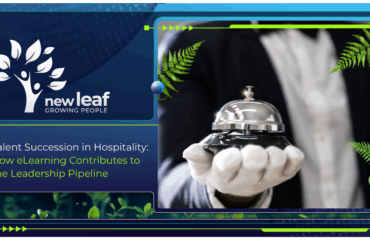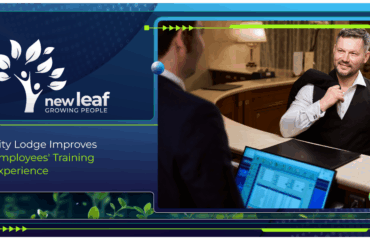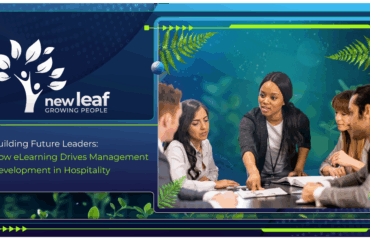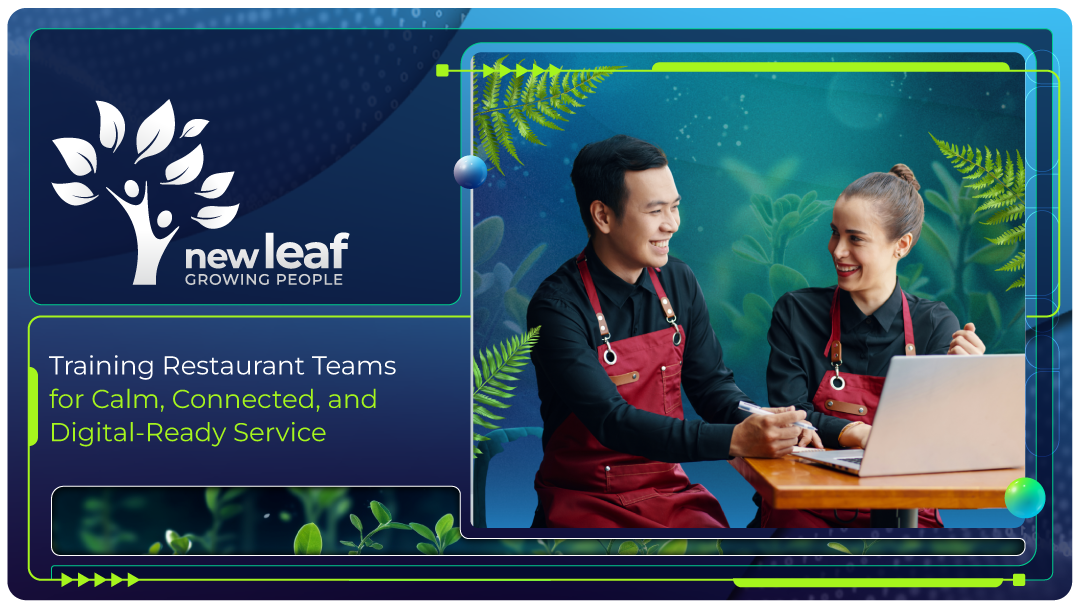
Today’s restaurant floor is a pressure chamber where the hospitality team’s development relies on the ability to deliver speed, warmth, precision, and tech fluency all at once. Personalised experiences, contactless payments, and digital interactions, which were originally considered luxury touches, are now baseline expectations, according to Oracle’s 2025 Hospitality Report.
A 2025 Tourism and Hospitality Journal study identified three key “service gaps” that drive lower repurchase intent: weak delivery systems, mismatched expectations, and a lack of proactive service behaviours.
For L&D (learning & development) and HR leaders, this underscores an urgent need for eLearning programs that build calm, connected, and technologically ready teams capable of meeting the new digital service training standard.
Key Takeaways
- Customers want speed, personalisation, and digital fluency more than ever.
- Restaurant staff training must balance emotion, tech, dietary knowledge, and coordination.
- Scenario-based learning prepares teams for high-pressure, unpredictable moments.
- Communication and team coordination are core service skills.
- Digital tool fluency must be embedded in service training.
- Audit your current training to identify gaps in communication, stress management, and digital readiness.
The Complexity of the Modern Hospitality Industry Development
Imagine a peak dinner rush: the restaurant is full, the kitchen is under pressure, one table has dietary allergy questions, another guest is unhappy about a delay, your app-based delivery system is inundated, and your POS is glitching.
In that moment, your frontline staff must simultaneously juggle:
- Turnaround speed.
- Personal connection with each guest.
- Deep recall of dietary and allergen requirements.
- Conflict de-escalation with upset customers.
- Fluent use of digital systems.
That level of complexity demands training that replicates the intensity of real life, where staff learn to remain calm, coordinate across teams, and deliver service with warmth despite the chaos. For global or multi-location operations, this training must be scalable, mobile-friendly, adaptive, and consistently applied across all locations.
The benefits of hospitality-focused eLearning include deeper staff engagement, improved compliance, more standardised service delivery, and greater retention.
For example: One of our clients, City Lodge Hotel Group (CLHG), needed to deliver consistent, high-quality service across its portfolio. New Leaf Technologies implemented the aNewSpring LXP (learning experience platform), integrated with CLHG’s sCubed HCM system, to create a seamless, mobile-friendly learning experience.
CLHG’s rollout included more than 150 internal online learning programs and access to 600+ ready-made soft skills and cybersecurity courses from New Leaf Technologies. Learners completed over 26,000 training activities, achieving a 91% overall completion rate and an impressive 89.6% assessment average.
Scenario-Based Training for High-Pressure Moments
High-pressure moments can lead to either service excellence or breakdown. If your employees can’t cope, the impact of those moments ripples through guest sentiment, team morale, and brand reputation.
Scenario-based learning is a top eLearning trend right now. It uses micro-simulations that enable frontline staff to rehearse events in a safe, controlled environment. They can use this training to:
- Experiment with responses.
- Understand the hand-offs between front- and back-of-house.
- Practice de-escalation.
- Test digital tools.
- Receive feedback on their choices.
This aligns with best-practice guidelines for restaurant staff training development: interactive, engaging, role-specific, and mobile-accessible. The key benefit? When the real moment hits, your staff have already “been there” and are primed to respond with composure, clarity, and service focus.
Michael Hanly, General Manager at New Leaf Technologies, says scenario-based training is one of the best ways a restaurant team can prepare for real challenges before they happen. “By practicing high-pressure situations in a safe environment, staff build the confidence and composure needed to deliver exceptional service every time.”
Communication as a Core Service Skill
Behind every smooth service moment is strong communication, both with the guest and internally across the team. This means training must focus on:
- Active listening: Recognising guest cues, reading body language, and responding with empathy.
- Reading customer signals: Such as a guest wanting quick service versus a relaxed experience.
- Team coordination: Clear hand-offs between front- and back-of-house, and between digital/delivery functions and in-venue service.
- Clear escalation and de-escalation protocols: Knowing when and how to intervene calmly, redirect, or engage specialist support.
The human element still matters. Tools and systems support the process, but the guest remembers how they felt when someone truly listened, took control, and resolved their need.
Good eLearning programs for restaurant staff training development incorporates blended learning, branching scenarios, peer-learning forums, reflective practice, and “what would you do?” prompts to build that human-centric communication muscle.
“Blended learning allows restaurant teams to build confidence, empathy, and digital fluency by combining digital simulations with real-world practice. The result is staff can perform under pressure, connect authentically with guests, and adapt to the technology shaping modern service.”
— Michael Hanly, General Manager at New Leaf Technologies
Digital Tool Fluency
In the new normal of restaurant service, digital fluency is no longer negotiable. Staff need confidence and competence with:
- POS systems (order entry, split bills, payment types).
- Reservation and table-management platforms.
- Delivery integration tools (online orders, take-out, curbside).
- Mobile payment options, loyalty programs, and guest-profile look-ups.
Effective eLearning supports this by giving learners a sandbox to practice unfamiliar tools in simulated high-load conditions.
How eLearning Supports The New Service Standard
Why does digital learning (eLearning and scenario-based modules) development make sense in this marketplace? Here are the key advantages:
- Scalable and consistent: A multi-site restaurant chain can deploy the same service and tech training globally.
- Mobile-first and convenient: Teams can train during gaps, on shift handovers, or quiet moments, which is ideal for deskless, frontline staff.
- Risk-free simulation: Learners can test responses to system failures, difficult guests, and coordination breakdowns without real-world consequences.
- Flexible update cadence: eLearning content can be refreshed quickly as new platforms/tools/guest expectations emerge, which is essential in a fast-moving hospitality technology environment.
- Data & measurement: Training intelligence analytics reveal where training gaps persist, enabling HR/L&D to intervene strategically.
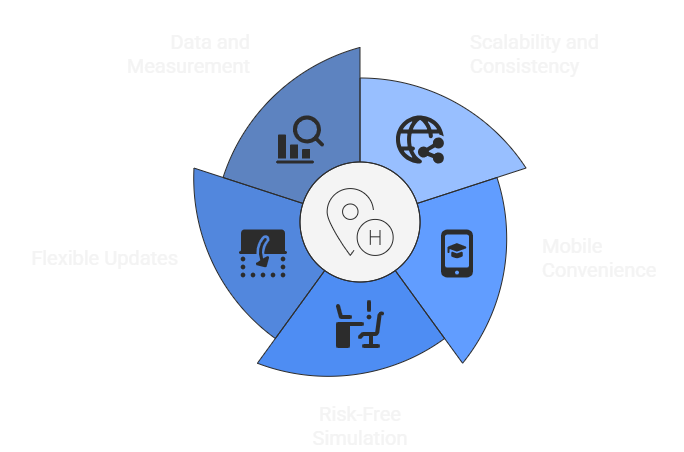
Audit Your Training Program: Where are the Gaps?
To ensure that your training matches the evolved standard of service, ask yourself and your team:
- Does our current training address high-pressure, real-time scenarios (system outages, double bookings, delivery surges) or is it still checklist-based?
- Have we included modules on stress management and team coordination for peak-period service?
- Do we explicitly train digital tool fluency (POS, reservation systems, online orders) as part of service flow, or do we treat tech training separately?
- Is communication training included? Not just “how to take an order” but how to read guest cues, handle conflict, coordinate hand-offs, and support teammates under load?
- Are our learning pathways mobile-accessible and designed for frontline staff’s working rhythm (shifts, downtime, busy periods)?
- Do we have analytics to identify where learners struggle (e.g., tool usage, guest de-escalation, coordination) and feed that back into training design?
Train your Restaurant Teams with New Leaf Technologies
Ready for your restaurant teams’ training to evolve along with service demands and technical literacy? Partner with New Leaf Technologies to design scenario-based eLearning that equips your teams not just to survive service spikes, but to excel in them.
Empower your teams. Build their confidence. Elevate your service. The future of restaurant service is calm, connected, and digital-ready. Contact us and let’s usher it in.
FAQ
How can we train for digital tools without losing the personal touch that defines great hospitality?
By integrating digital tool training with soft-skill development, eLearning modules can simulate real guest interactions, where learners practice using POS or reservation systems while maintaining eye contact and using the correct tone. The goal is to make technology feel like an integral part of the service, rather than a barrier to it.
What’s the most effective way to practice high-pressure service scenarios without overwhelming new staff?
Scenario-based learning allows staff to rehearse real-world challenges in a safe, low-stakes environment. Start with simple simulations and gradually increase complexity as the learners’ confidence grows.
How often should restaurant teams refresh their service training to stay current?
Training should be refreshed every six months (at a minimum), or whenever new digital tools, menus, or customer service trends are introduced. Regular microlearning or short refresher modules keep knowledge sharp and ensure consistency across shifts and teams.

